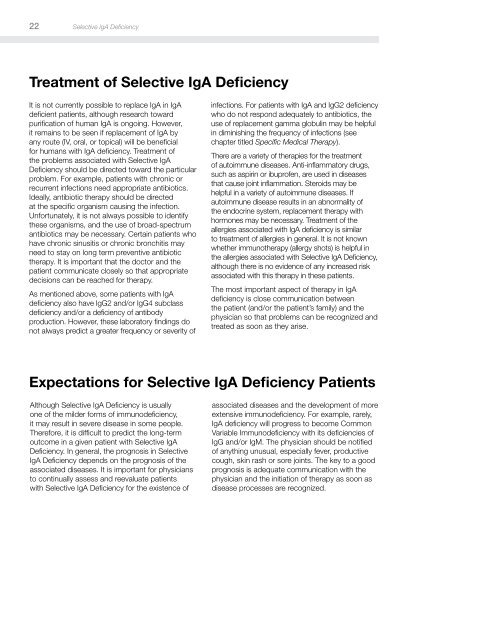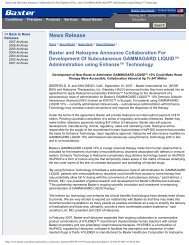IDF Patient & Family Handbook for Primary Immunodeficiency ... - IDFA
IDF Patient & Family Handbook for Primary Immunodeficiency ... - IDFA
IDF Patient & Family Handbook for Primary Immunodeficiency ... - IDFA
You also want an ePaper? Increase the reach of your titles
YUMPU automatically turns print PDFs into web optimized ePapers that Google loves.
22 Selective IgA Deficiency<br />
Treatment of Selective IgA Deficiency<br />
It is not currently possible to replace IgA in IgA<br />
deficient patients, although research toward<br />
purification of human IgA is ongoing. However,<br />
it remains to be seen if replacement of IgA by<br />
any route (IV, oral, or topical) will be beneficial<br />
<strong>for</strong> humans with IgA deficiency. Treatment of<br />
the problems associated with Selective IgA<br />
Deficiency should be directed toward the particular<br />
problem. For example, patients with chronic or<br />
recurrent infections need appropriate antibiotics.<br />
Ideally, antibiotic therapy should be directed<br />
at the specific organism causing the infection.<br />
Un<strong>for</strong>tunately, it is not always possible to identify<br />
these organisms, and the use of broad-spectrum<br />
antibiotics may be necessary. Certain patients who<br />
have chronic sinusitis or chronic bronchitis may<br />
need to stay on long term preventive antibiotic<br />
therapy. It is important that the doctor and the<br />
patient communicate closely so that appropriate<br />
decisions can be reached <strong>for</strong> therapy.<br />
As mentioned above, some patients with IgA<br />
deficiency also have IgG2 and/or IgG4 subclass<br />
deficiency and/or a deficiency of antibody<br />
production. However, these laboratory findings do<br />
not always predict a greater frequency or severity of<br />
infections. For patients with IgA and IgG2 deficiency<br />
who do not respond adequately to antibiotics, the<br />
use of replacement gamma globulin may be helpful<br />
in diminishing the frequency of infections (see<br />
chapter titled Specific Medical Therapy).<br />
There are a variety of therapies <strong>for</strong> the treatment<br />
of autoimmune diseases. Anti-inflammatory drugs,<br />
such as aspirin or ibuprofen, are used in diseases<br />
that cause joint inflammation. Steroids may be<br />
helpful in a variety of autoimmune diseases. If<br />
autoimmune disease results in an abnormality of<br />
the endocrine system, replacement therapy with<br />
hormones may be necessary. Treatment of the<br />
allergies associated with IgA deficiency is similar<br />
to treatment of allergies in general. It is not known<br />
whether immunotherapy (allergy shots) is helpful in<br />
the allergies associated with Selective IgA Deficiency,<br />
although there is no evidence of any increased risk<br />
associated with this therapy in these patients.<br />
The most important aspect of therapy in IgA<br />
deficiency is close communication between<br />
the patient (and/or the patient’s family) and the<br />
physician so that problems can be recognized and<br />
treated as soon as they arise.<br />
Expectations <strong>for</strong> Selective IgA Deficiency <strong>Patient</strong>s<br />
Although Selective IgA Deficiency is usually<br />
one of the milder <strong>for</strong>ms of immunodeficiency,<br />
it may result in severe disease in some people.<br />
There<strong>for</strong>e, it is difficult to predict the long-term<br />
outcome in a given patient with Selective IgA<br />
Deficiency. In general, the prognosis in Selective<br />
IgA Deficiency depends on the prognosis of the<br />
associated diseases. It is important <strong>for</strong> physicians<br />
to continually assess and reevaluate patients<br />
with Selective IgA Deficiency <strong>for</strong> the existence of<br />
associated diseases and the development of more<br />
extensive immunodeficiency. For example, rarely,<br />
IgA deficiency will progress to become Common<br />
Variable <strong>Immunodeficiency</strong> with its deficiencies of<br />
IgG and/or IgM. The physician should be notified<br />
of anything unusual, especially fever, productive<br />
cough, skin rash or sore joints. The key to a good<br />
prognosis is adequate communication with the<br />
physician and the initiation of therapy as soon as<br />
disease processes are recognized.
















